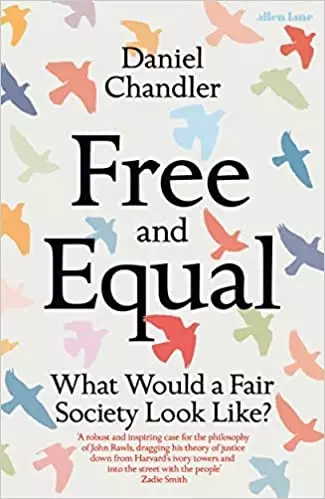Free and Equal:
Daniel Chandler
"Free and Equal: What Would a Fair Society Look Like", Daniel Chandler
Daniel Chandler is an unqualified admirer of John Rawls, whom he acclaims as ‘the twentieth century’s greatest political philosopher’ (p3, 52), a claim advanced without evidence or proof, whilst contrarily admitting that Rawls made little public impact (p7), and ‘said relatively little about race’ (p185), despite this being a major issue in US society. Otherwise, Chandler credits Rawls’ principles with almost universal ethical power. Rawls becomes a messianic figure.
Rawls’ theory of justice as fairness generates his principles of justice as an equal claim to basic rights and liberties, equal opportunities, and maximising benefits to least advantaged people, his ‘maximin’ (p60) difference principle, all subject to his savings principle of inter-generational equity.
Chandler cites Robert Nozick’s critique of Rawls (p77) in defence of personal property rights. He also cites Amartya Sen’s view that Rawls is too ‘transcendental’ (p97). A wider contrast however is that whilst Sen in his ‘The Idea of Justice’ found justice elusive to define (in his example of which of 3 girls should own a flute, the one who made it, the one who can play it, or the one who has no other toys), Rawls’s principles suggest an almost mathematically exact maximin definition of distributive justice.
Subsequent chapters on freedom and democracy are rather mundane and repetitive, but the section on education is interesting and stimulating. Funding of early years education to the level of Denmark’s 1.3% of GDP (p176) to achieve the Scandinavian result where inherited income advantage is <20% compared to UK/US 50% (p172) is a compelling argument, as is reducing the UK university student fees from being above any peer country (p183), and increasing UK education spend to international levels (p184). But the proposal to ban private schools (p177) is too extreme and counterproductive. The aim should be to level up not down, to create state schools performing equally as well as private schools. This is not impossible. I benefitted from a state school education in the 1960s, and at university found it an equally strong foundation for any privately schooled student. Parents currently contribute some £9bn to the education sector through private schools. Better to let them keep doing that whilst matching private schools offer in state schools.
Chandler is 100% right in proposing basic income (p210ff). Automation is reducing aggregate labour income, and conditionality wreaks havoc in poverty and unemployment traps, humiliation and intrusion. UBI is affordable as work with Cambridge Econometrics shows. More elsewhere on this site www.ubi.org. Hiking taxes is not the only solution. Wealth taxes have been withdrawn because wealth is a stock and income a flow because wealth is held in many forms, making administration very complex. Can a wealth tax be paid in wealth? Workplace democracy is a fine concept, except that the skills of management, leadership and entrepreneurship are rare. The German model is appealing but goes with long-term stable stock market funding and a deep social contract which is widely embraced. Chandler then provides 110 pages of notes, showing that the book is well-researched.
The book is available here.
Geoff Crocker
Editor ‘The Case for Universal Basic Income'
www.ubi.org

